Posted by: Northwest Eye in General on June 5, 2025
Overview
We understand that navigating Medicare coverage for cataract surgery can be overwhelming. Medicare does cover cataract surgery when it is deemed medically necessary, which includes standard lens implants and follow-up care for up to 90 days post-surgery. However, it’s important to note that advanced lens options often incur additional costs.
The details of this coverage are outlined under Medicare Part B, and we want to emphasize the importance of understanding potential out-of-pocket expenses. This is particularly crucial for premium lenses that are not included in the standard coverage. We are here to help you through this process, ensuring you feel supported and informed every step of the way.
Introduction
Navigating the complexities of cataract surgery can indeed feel overwhelming. We understand that considering the financial implications and insurance coverage adds to this stress. For many patients, grasping how Medicare fits into this equation is crucial for making informed decisions about their eye health. With over 50 years of experience, Northwest Eye stands out as a trusted provider, offering a range of advanced surgical options and personalized care.
This article delves into essential aspects of Medicare coverage for cataract surgery. We will explore:
- What is included
- Potential out-of-pocket costs
- The importance of follow-up care
By equipping you with the necessary knowledge, we aim to enhance your overall experience and outcomes in this critical area of healthcare. Remember, we are here to help you through this process.
Northwest Eye: Comprehensive Cataract Surgery Services
At Northwest Eye, we understand that considering eye surgery can be a significant decision, and we are here to help you through this process. For over 50 years, we have been a reliable provider of eye surgery, utilizing advanced techniques such as the Light Adjustable Lens and refractive lens exchange.
Our comprehensive services begin with thorough pre-operative evaluations, ensuring that we address your unique needs and concerns. We employ state-of-the-art surgical techniques and provide tailored post-operative support, all aimed at ensuring optimal results for individuals of all ages.
With expertise in lens issues, glaucoma, LASIK, and pediatric care, we are committed to delivering outstanding eye care across various Twin Cities locations, including , , and Maple Grove. We also offer financial assistance and insurance verification to help you navigate your coverage options, including understanding does Medicare cover cataract surgery. By employing the newest technology, we strive to improve client satisfaction and recovery rates. We want you to feel confident in choosing Northwest Eye as your top option for lens procedures in the Twin Cities region. Remember, you are not alone on this journey; we are here to support you every step of the way.
Medicare Parts Overview: Coverage for Cataract Surgery
The federal health program consists of several components, with Part A providing hospital insurance and Part B offering outpatient services, including eye procedures. We understand that if you are undergoing lens replacement, it’s essential to know when the procedure is deemed medically necessary. This support includes surgical expenses and necessary follow-up care, ensuring you receive comprehensive assistance throughout your treatment journey.
In 2025, statistics indicate that a significant number of individuals receiving government health benefits undergo cataract procedures, highlighting its prevalence among older adults. However, it’s important to be aware that opting for enhanced intraocular lenses may lead to additional costs beyond what your insurance covers. Specifically, you would be responsible for 20% of the Medicare Part B copay, along with any out-of-pocket expenses like deductibles and medication fees, which can influence the overall cost of surgery.
At Northwest Eye, we encourage you to check with your insurance provider to confirm that we are in-network and that your plan covers the services we offer. We accept a variety of health plans, and you can easily pay your bills online using different payment options, including Debit, HSA, Visa, American Express, MasterCard, and Discover. Please note that if you have a vision plan, you will need to pay in full for your services, as Northwest Eye does not participate with any vision plans.
Additionally, the requirement for a referral or authorization varies by insurance plan. While we strive to assist with prior authorizations, it is ultimately your responsibility to ensure it is obtained before receiving services. Michael Shumski, a board-certified eye doctor specializing in lens procedures and vision correction at Magruder Laser Vision in central Florida, emphasizes the importance of understanding the specifics of your health insurance coverage. He notes that being informed about what is included and what is excluded can significantly impact your decision-making process regarding surgical options.
Case studies reveal that individuals who are well-informed about their eye treatment choices, including the financial aspects of advanced options, are better prepared to make informed decisions. This understanding not only helps navigate the complexities of Medicare coverage, such as whether does Medicare cover cataract surgery, but also enhances your overall experience. Informed patients can make better choices regarding their cataract treatment options, fully grasping both the medical and financial elements involved.
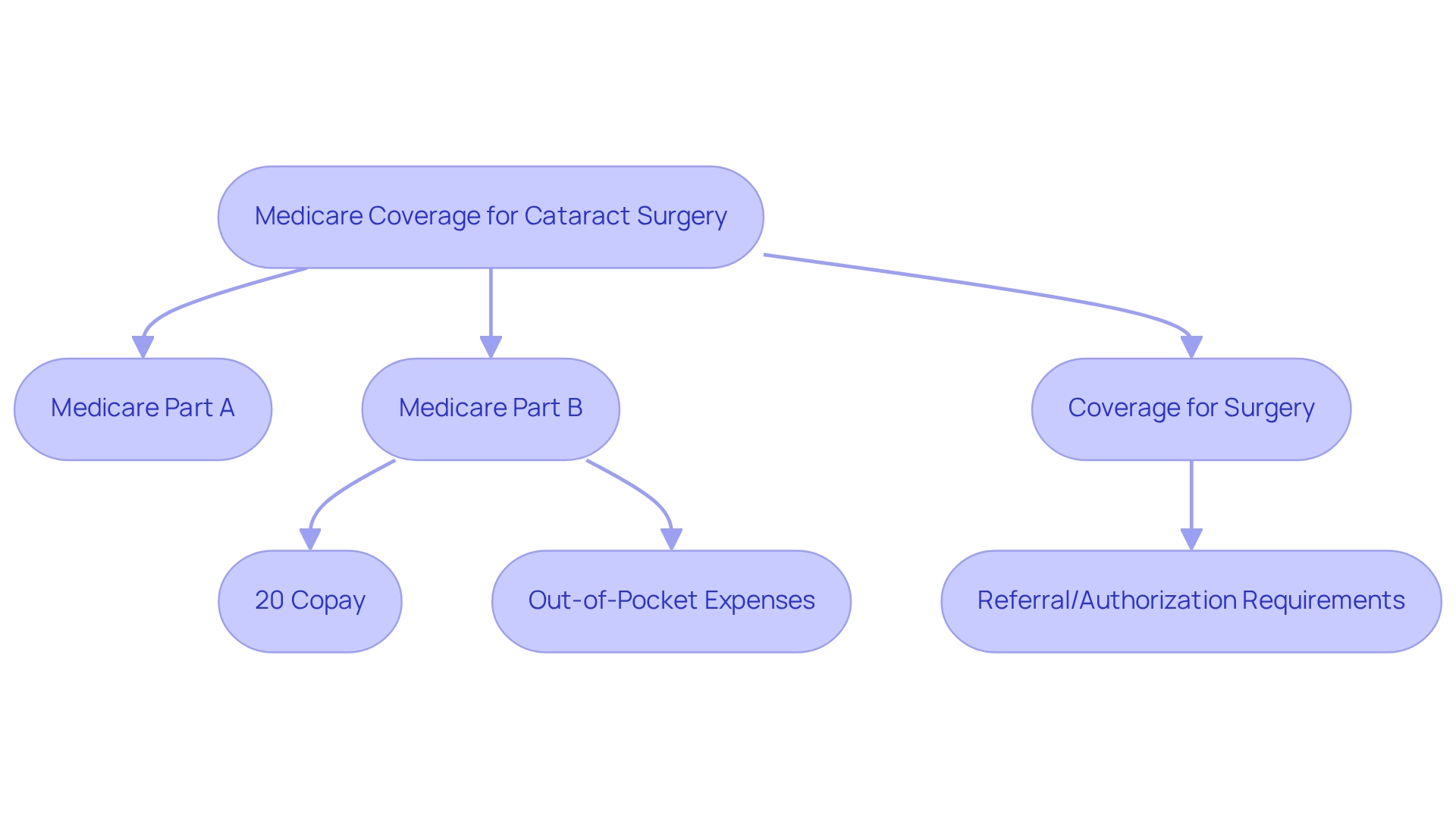
Cost Considerations: Cataract Surgery Expenses with Medicare
Cataract surgery costs can vary significantly based on the facility and the specific procedure performed. We understand that navigating these expenses can be daunting. In 2025, Part B typically covers around 80% of the approved expenses once the yearly deductible of $257 is fulfilled, but it’s essential to check if Medicare covers cataract surgery. This means individuals should anticipate additional out-of-pocket costs, including a 20% coinsurance, which averages about $320 based on the total expenses covered by Medicare, and they may wonder, does Medicare cover cataract surgery, along with any charges for premium lens options that Medicare does not include.
To effectively manage these expenses, it’s crucial to engage in open discussions with your healthcare providers about the benefits and costs associated with different surgical techniques and lens options. As highlighted in the case study “Importance of Communication with Eye Doctors,” effective communication can lead to a clearer understanding of potential costs and help you make informed choices regarding your care. Consulting with a licensed agent can also provide valuable insights into coverage details, assisting you in avoiding unexpected expenses.
Furthermore, it’s essential to recognize that health insurance, specifically inquiring about whether does Medicare cover cataract surgery, encompasses both conventional surgical methods and laser-assisted techniques for eye lens operations. To ease the financial burden, Northwest Eye offers financing options through CareCredit, including:
- 0% interest financing for up to 24 months
- Low-interest options for up to 60 months, with payments as low as $100 per month
This flexibility can significantly enhance your access to necessary eye care services.
Overall, being proactive in understanding the financial implications of lens replacement procedures under the government program, along with exploring funding alternatives, can greatly influence your experience and outcomes. We are here to help you through this process.
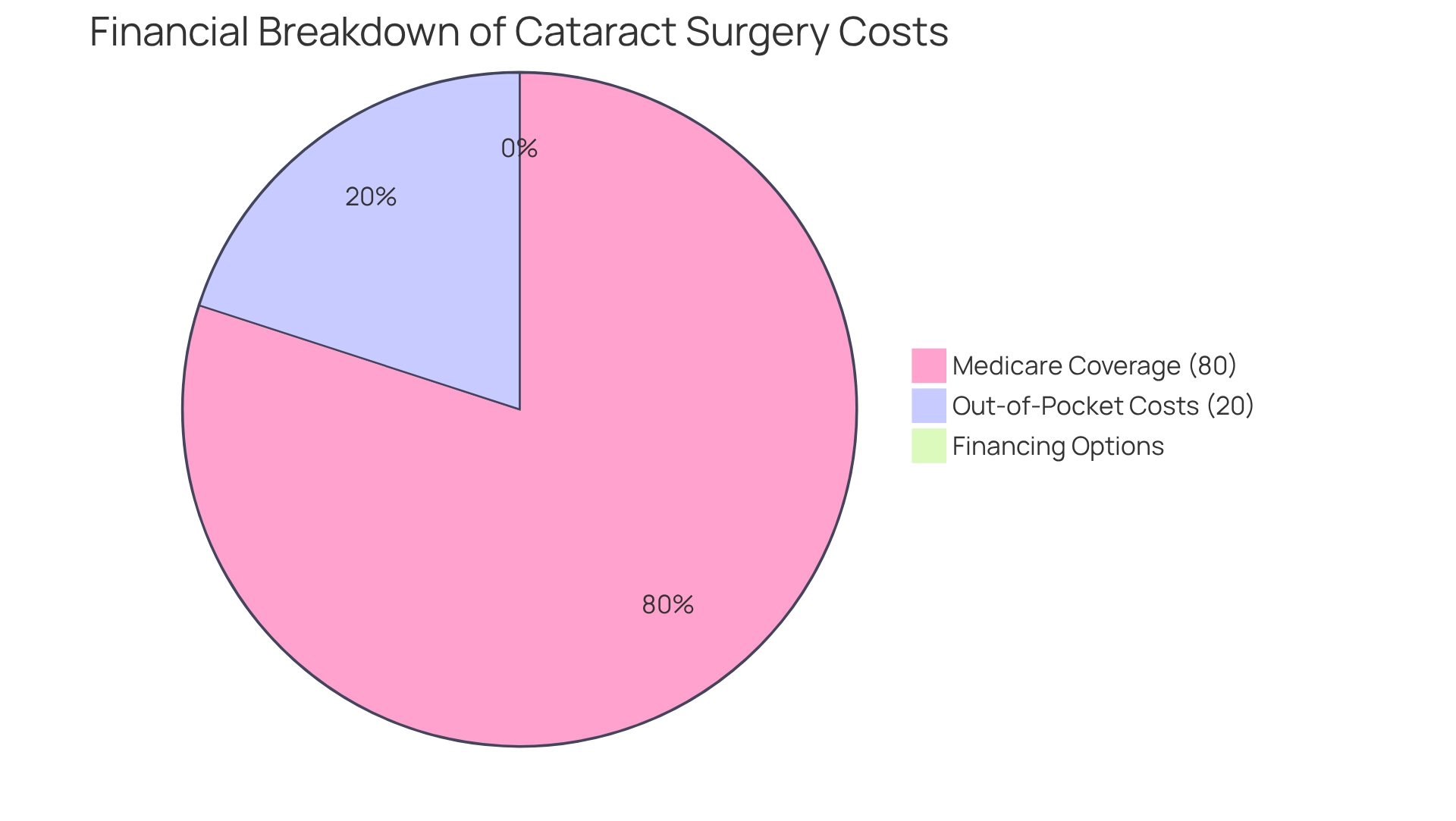
Lens Options: What Medicare Covers for Cataract Surgery
The program mainly covers (IOLs) during cataract surgery, designed to provide clear vision at a single distance. We understand that individuals seeking advanced lens options, such as multifocal or toric lenses that correct astigmatism, may feel concerned about their choices, particularly when considering what does Medicare cover cataract surgery. Consequently, choosing premium lenses will incur extra out-of-pocket costs.
It is essential for individuals to have conversations with their surgeons about lens choices to determine the best match for their vision needs and financial situations. Statistics indicate that a significant percentage of patients—approximately 30%—choose premium lenses during their eye surgeries, reflecting a growing trend towards advanced solutions for improved visual outcomes.
Expert opinions highlight the importance of understanding the implications of selecting premium lenses. While standard lenses may suffice for many, advanced options can enhance quality of life by reducing dependence on glasses post-surgery. However, it’s common to feel apprehensive about weighing these advantages against possible expenses.
A significant case study demonstrates the obstacles encountered by individuals concerning coverage: many discover that while refraction tests, frequently utilized to evaluate vision post-operation, are not included in government health plans, they are crucial for assessing the efficacy of the selected lens. This absence of coverage can lead to unforeseen costs for individuals aiming to enhance their vision after surgery.
To help manage these expenses, Northwest Eye provides various financing choices that can aid individuals in affording eye examinations, vision assessments, and treatments for lens issues. Patients should also be aware that Northwest Eye accepts a wide range of health plans, but it does not participate with vision plans, meaning those with such plans will be responsible for payment in full for their services. Ultimately, we encourage individuals to be proactive in exploring their alternatives and understanding whether Medicare covers cataract surgery and the details of healthcare coverage for lens procedures, to make informed choices that align with their health and financial objectives.
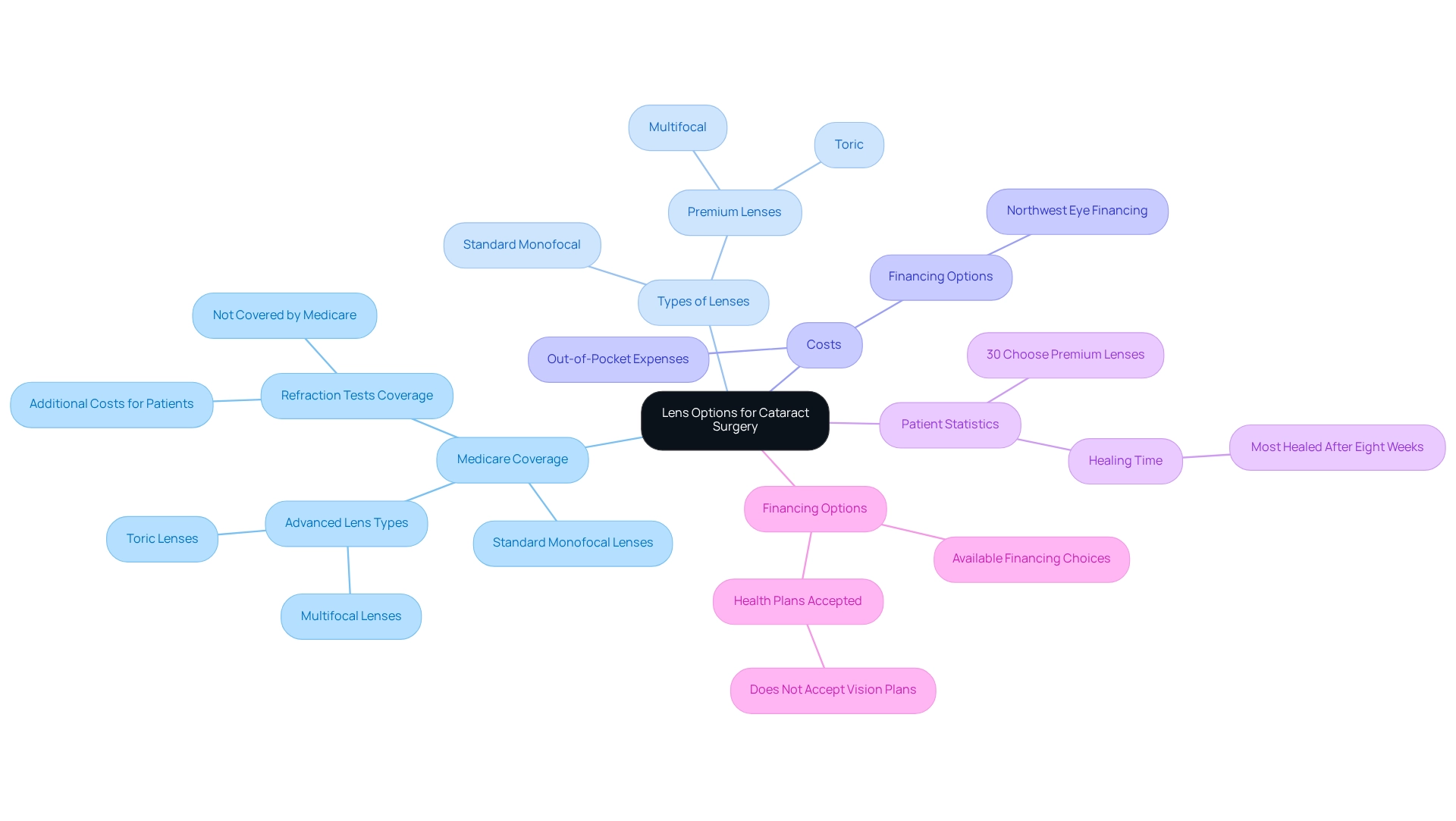
Post-Operative Care: Medicare Coverage for Follow-Up Services
One of the important questions to consider is, does Medicare cover cataract surgery, as it offers coverage for follow-up care associated with cataract procedures for up to 90 days after the operation. This coverage includes essential examinations and treatments necessary to monitor recovery and address any potential complications.
We understand that arranging follow-up appointments with your ophthalmologist can feel daunting, but these visits are crucial for assessing the success of your surgery and making any necessary adjustments to your treatment plan. Expert insights emphasize that greatly improves outcomes for those receiving treatment. Research has shown that individuals who adhere to follow-up schedules experience fewer complications and enhanced visual clarity. Timely follow-up can lead to early identification of issues like infection or lens misalignment, allowing for swift intervention.
Furthermore, ophthalmologists highlight the importance of these appointments in relation to insurance coverage. Dr. Daniel S. Durrie suggests that understanding the details of what is covered can empower you to take control of your recovery process. By effectively leveraging your Medicare benefits, you can ensure comprehensive care that supports your long-term eye health, particularly in understanding if Medicare covers cataract surgery.
Positive reviews from individuals reflect the clinic’s commitment to excellence, underscoring the impact of diligent follow-up care on satisfaction and outcomes. Additionally, insights from Dr. Maloney emphasize the significance of balancing care with effective practice management, reinforcing the need for thorough follow-up in your recovery journey.
Special Conditions: Medicare Coverage for Astigmatism in Cataract Surgery
Medicare does not cover eye procedures specifically intended to correct astigmatism unless they are deemed medically necessary. We understand that this can be concerning for patients who may require toric lenses or other advanced options to address their astigmatism. It’s important to be prepared for additional out-of-pocket expenses. We encourage patients to communicate their specific needs with their surgeon to fully grasp the implications for their procedure and the potential costs involved.
Statistics indicate that around 30% of lens procedures involve the use of toric lenses, highlighting their growing significance in treating astigmatism. Patient testimonials emphasize the compassionate approach and effective treatments provided by clinics, underscoring the importance of thorough pre-surgery consultations. As David Haass, an ophthalmologist, states, ‘Yes, because funded by government health insurance is a benefit provided to you as a beneficiary, does Medicare cover cataract surgery as long as it is medically necessary.’ This underscores the importance of customizing surgical methods to meet each individual’s unique requirements.
Moreover, considering case studies on Advantage plans reveals possible coverage restrictions that patients may encounter. It is essential to have thorough conversations with healthcare professionals to navigate these choices efficiently. Remember, we are here to help you through this process.
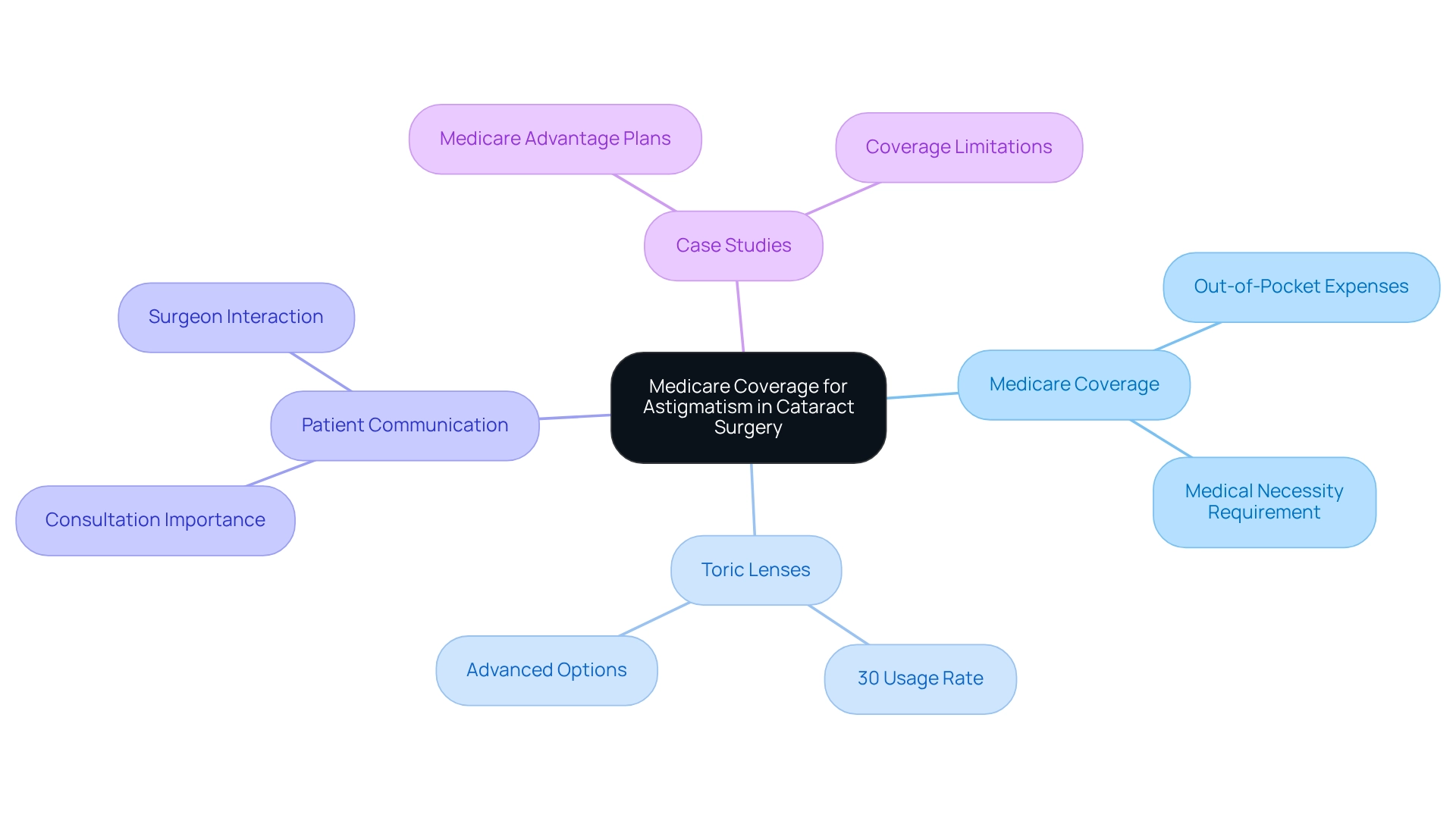
Limitations of Coverage: What Medicare May Not Include for Cataract Surgery
We understand that navigating eye procedures and figuring out if [Medicare covers cataract surgery](https://nweyeclinic.com) can be overwhelming. While the program provides significant support for essential eye procedures under Part B, it is important to know the limitations regarding whether Medicare covers cataract surgery. , such as routine eye examinations or spectacles, is not included unless directly related to the eye operation. Furthermore, advanced lens options and elective procedures are typically not covered, which may leave patients responsible for approximately $532 per eye if the procedure occurs in a hospital setting. It’s crucial to comprehend your specific health insurance plan, particularly to find out if it answers the question of whether Medicare covers cataract surgery to avoid unexpected costs.
For those enrolled in private Advantage plans, there may be additional coverage options available for eye lens procedures. As Kimberly Lankford highlights, “If you choose protection from a private Advantage plan, instead of original coverage, you’ll also have support for eye lens procedures.” We encourage individuals to consult with their healthcare provider and thoroughly examine their health insurance plan to understand if it includes coverage for procedures, such as whether Medicare covers cataract surgery, and any specific limitations that may apply to their situation. Additionally, Humana Advantage plan members can reach out for questions regarding coverage for eye procedures, providing a valuable resource for those seeking detailed information about their options. This proactive approach can help ensure that individuals are well-informed and prepared for any potential financial responsibilities associated with their eye procedure.
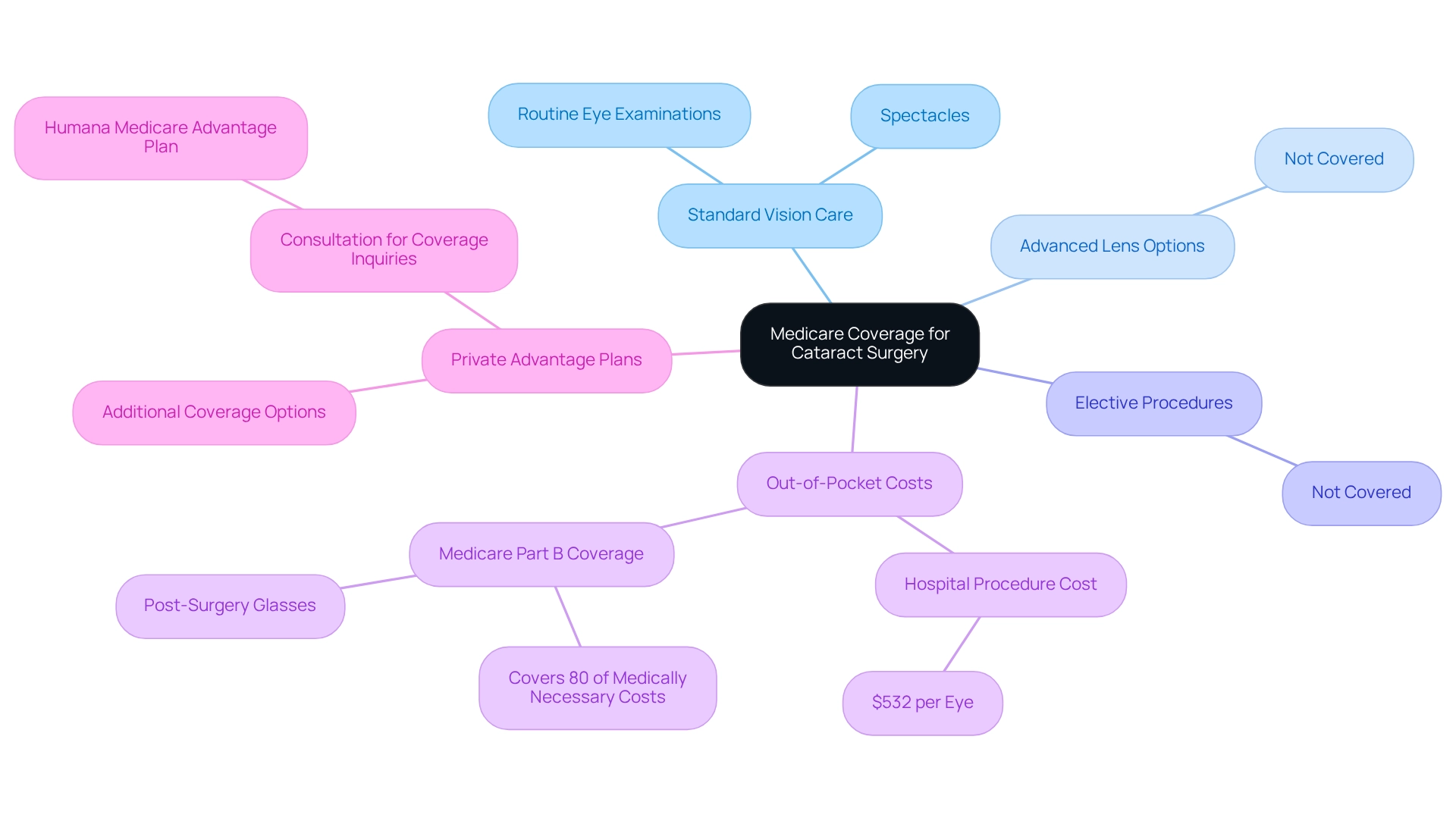
Medicare Advantage Plans: Additional Coverage for Cataract Surgery
Advantage plans, often referred to as Part C, can provide enhanced coverage for cataract surgery that goes beyond what Original coverage offers, but does Medicare cover cataract surgery? These plans frequently include benefits for advanced lens options, routine eye exams, and various vision-related services, which can significantly improve your overall outcomes. In 2024, 54% of beneficiaries with both Part A and B chose Advantage plans, indicating a growing trend toward these comprehensive options.
We understand that navigating details can feel overwhelming. It’s important to review the specifics to fully grasp your coverage and any potential out-of-pocket costs. Notably, a significant percentage of beneficiaries—67.6% in 2017—were diagnosed with multiple chronic conditions, highlighting the need for tailored healthcare solutions.
In addition to coverage, Northwest Eye offers affordable financing options for eye care services, including 0% interest financing for up to 24 months through CareCredit. This support helps you manage expenses and obtain essential treatments without financial burden, improving access to the eye care you need, while also addressing the question of whether does Medicare cover cataract surgery. Consulting with a health insurance advisor can provide clarity on the best options available, ensuring you make informed decisions about your cataract surgery coverage. As the landscape of Advantage plans continues to evolve, understanding these additional benefits is crucial for maximizing your healthcare resources and achieving optimal eye health. To effectively review your Advantage plan, consider creating a checklist of covered services and potential expenses. Don’t hesitate to reach out to an advisor for personalized guidance. Additionally, if you are experiencing symptoms such as blurred vision, which may suggest underlying issues like lens opacities or other eye conditions, seeking professional medical assistance is vital.
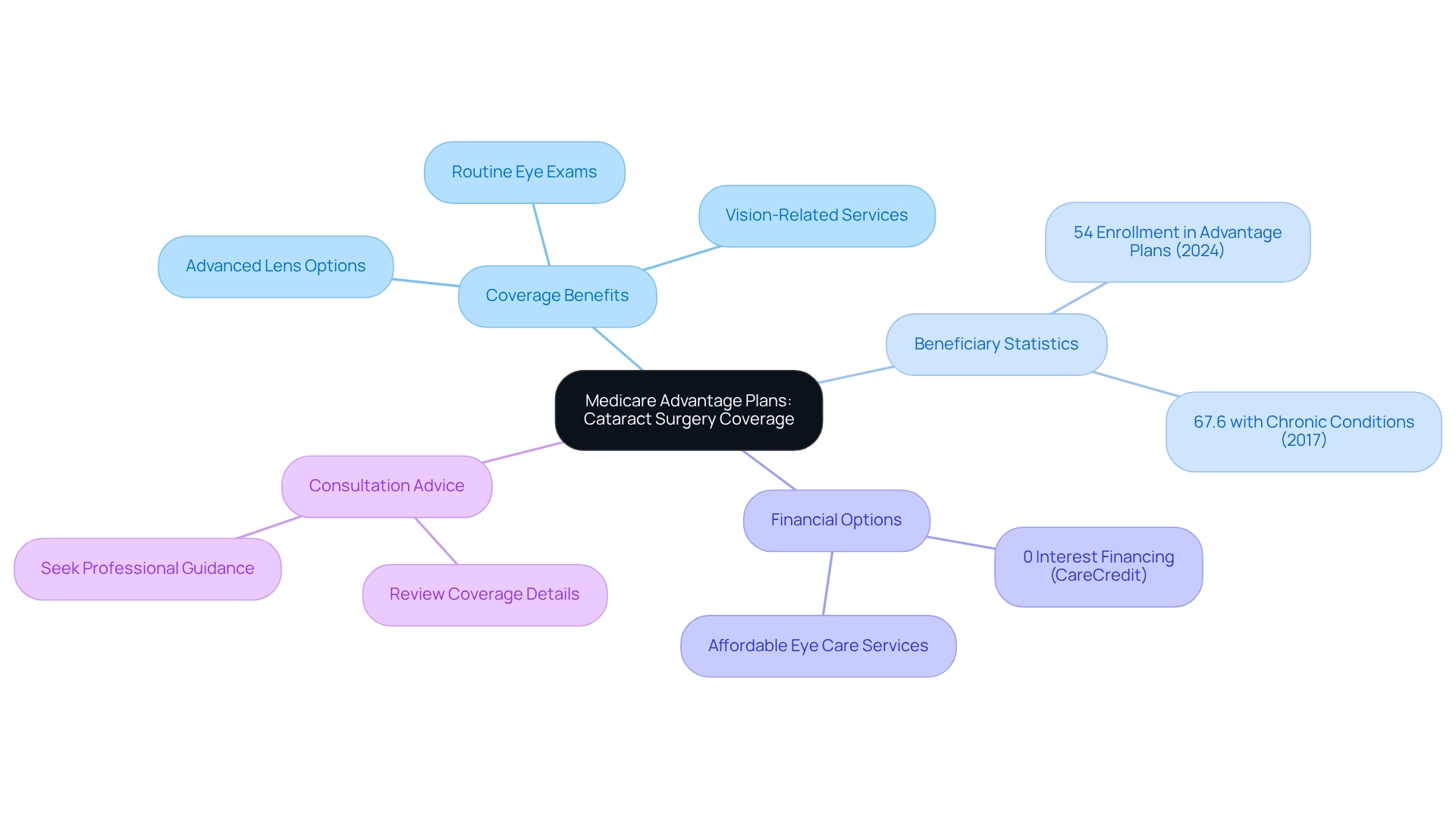
FAQs: Common Questions About Medicare and Cataract Surgery
- Is there coverage for eye lens replacement procedures? Yes, we understand that navigating your healthcare options can be overwhelming. Rest assured, the program ensures that when it comes to does Medicare cover cataract surgery deemed medically essential under Part B, you receive vital care without excessive financial strain.
- What costs will I incur? After meeting your deductible, you will typically pay 20% of the Medicare-approved amount for the surgery. It’s common to feel uncertain about financial obligations, so understanding these costs ahead of time is crucial for your peace of mind.
- Are advanced lenses covered? Generally, advanced lens options such as multifocal or toric lenses are not covered by the program. We encourage you to discuss all available options with your healthcare provider to make informed decisions that suit your needs.
- What about follow-up care? We recognize the importance of recovery. The program offers coverage for follow-up care for up to 90 days after surgery, which includes necessary examinations and treatments to ensure optimal recovery and eye health.
- Can I get additional coverage? Yes, Advantage plans may provide extra benefits for eye procedures and associated services. This can give you more comprehensive choices tailored to your specific requirements.
- What are typical questions from individuals concerning coverage for lens extraction? Many individuals frequently inquire about their coverage details, including which types of lenses are included and the extent of follow-up care covered. It’s natural to have these questions, and we are here to help you find the answers.
- What data indicate inquiries regarding healthcare and lens procedures? Recent data reveals that a significant number of individuals express confusion about their coverage options. This highlights the importance of clear communication from healthcare providers. A study found that roughly 30% of individuals expressed uncertainty regarding their health benefits related to lens operations.
- What do specialists state regarding coverage for cataract surgery? Healthcare professionals emphasize the importance of being well-informed about your health care benefits, particularly regarding whether Medicare covers cataract surgery, to avoid common pitfalls and maximize your coverage. As , co-founder of a healthcare advisory service, wisely states, “Learn the most common costly healthcare mistakes and how to avoid them.”
- Are there actual case studies focusing on eye procedures and health insurance? For instance, Dakota Eye Institute showcases how innovative lens procedures can enhance patient outcomes. This underscores the significance of selecting a provider who understands the complexities of healthcare coverage. Their use of advanced technology has been shown to improve recovery times and patient satisfaction.
- What frequently asked questions should individuals consider regarding health insurance and cataract surgery in 2025? It’s essential to stay informed about any changes to healthcare policies and coverage options. This ensures you have the most up-to-date information to make knowledgeable decisions regarding your eye care. Northwest Eye, known for its high client satisfaction rates, can offer valuable insights into navigating these options.
Key Takeaways: Essential Facts About Medicare and Cataract Surgery
The question of whether Medicare covers cataract surgery includes coverage for medically necessary procedures, such as standard lens implants, under Medicare Part B. This ensures that you can access vital surgical procedures without facing significant financial burden. Once you reach your deductible, you will be responsible for 20% of , including any copayments. This structure helps maintain consistent out-of-pocket costs for those undergoing the procedure. However, it’s important to understand that advanced lens options, such as premium intraocular lenses, are not covered by health insurance. If you are considering these enhancements, please be prepared for additional costs.
Aftercare is a critical part of your recovery process. The program covers this for up to 90 days after surgery, ensuring you receive the necessary evaluations and treatments during this time. We understand that navigating these details can be overwhelming, but when considering whether Medicare covers cataract surgery, it’s important to note that Medicare Advantage plans may offer additional benefits that extend beyond the standard coverage provided by Original Medicare. These plans can include enhanced coverage for cataract surgery and related services, making them a valuable option for those seeking comprehensive care. We are here to help you through this process.
Conclusion
Navigating the financial landscape of cataract surgery can feel overwhelming, but understanding Medicare coverage is essential for making informed decisions. We want you to know that Medicare Part B provides coverage for medically necessary cataract surgeries, which includes standard lens implants. After meeting your deductible, you will typically be responsible for 20% of the costs. This knowledge can help you anticipate your out-of-pocket expenses.
While Medicare covers essential follow-up care for up to 90 days post-surgery, it’s important to understand that advanced lens options, such as multifocal or toric lenses, are not included in the standard coverage. If you are considering these premium options, be prepared for additional costs. We encourage you to discuss your choices with your healthcare provider to ensure you understand the implications for both your vision and your finances.
For those enrolled in Medicare Advantage plans, additional benefits may be available that enhance coverage for cataract surgery and related services. This can provide a more comprehensive approach to your eye care. It’s crucial to review your specific plans and consult with healthcare providers to maximize your benefits.
Ultimately, being proactive about understanding Medicare coverage and engaging in open communication with your healthcare providers can significantly enhance your overall experience and outcomes during cataract surgery. By arming yourself with the right information, you can navigate your options effectively, ensuring you receive the care you need while managing your financial responsibilities. We are here to help you through this process.
Frequently Asked Questions
What services does Northwest Eye offer for cataract surgery?
Northwest Eye provides comprehensive cataract surgery services, including pre-operative evaluations, advanced surgical techniques like the Light Adjustable Lens and refractive lens exchange, and tailored post-operative support.
How long has Northwest Eye been providing eye surgery services?
Northwest Eye has been a reliable provider of eye surgery for over 50 years.
Where are Northwest Eye’s surgery centers located?
Northwest Eye has surgery centers in Minnetonka, Blaine, and Maple Grove.
Does Medicare cover cataract surgery?
Yes, Medicare Part B covers cataract surgery when deemed medically necessary, including surgical expenses and necessary follow-up care.
What additional costs might I incur if I choose enhanced intraocular lenses?
If you opt for enhanced intraocular lenses, you may be responsible for 20% of the Medicare Part B copay, along with any out-of-pocket expenses like deductibles and medication fees.
What payment options does Northwest Eye accept?
Northwest Eye accepts various payment options, including Debit, HSA, Visa, American Express, MasterCard, and Discover. However, if you have a vision plan, you will need to pay in full for your services.
Are referrals or authorizations required for cataract surgery?
The requirement for a referral or authorization varies by insurance plan. While Northwest Eye assists with prior authorizations, it is ultimately the patient’s responsibility to ensure it is obtained.
How does Medicare typically cover cataract surgery costs?
Medicare Part B typically covers around 80% of approved expenses after the yearly deductible of $257 is met, but individuals should anticipate additional out-of-pocket costs, including a 20% coinsurance.
What financing options does Northwest Eye offer for cataract surgery?
Northwest Eye offers financing options through CareCredit, including 0% interest financing for up to 24 months and low-interest options for up to 60 months, with payments as low as $100 per month.
Why is it important to understand the specifics of health insurance coverage for cataract surgery?
Understanding your health insurance coverage is crucial as it can significantly impact your decision-making process regarding surgical options and help avoid unexpected expenses.






